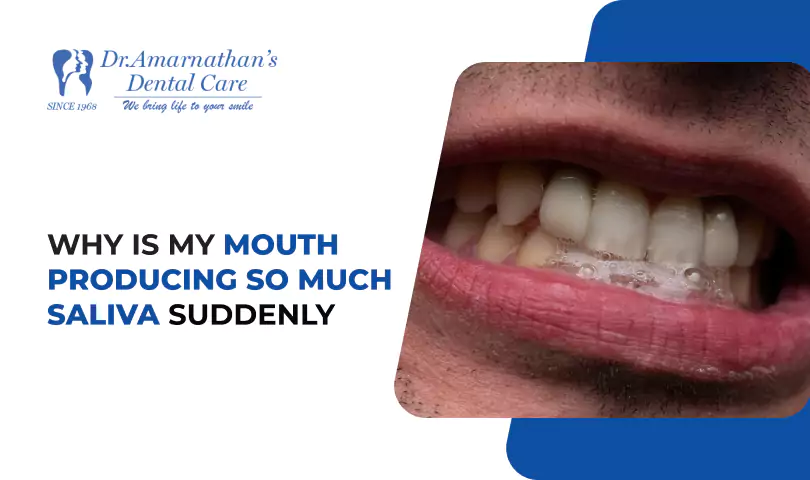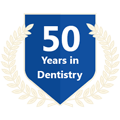
Why is my mouth producing so much saliva suddenly?
Are you suddenly reaching for tissues more than usual, confused by an unexpected increase in saliva production? While it may appear to be a small inconvenience, excessive salivation, or hypersalivation, can be confusing and painful. Understanding the causes of this rapid shift in your body’s behavior is critical for resolving any underlying concerns and restoring comfort.
In this blog, we will look at the numerous variables that might lead to increased saliva production, including dietary impacts, oral health concerns, medical difficulties, and drug side effects. We’ll also talk about when it’s vital to see a doctor and provide advice on how to deal with excessive saliva at home. Whether you’re suffering from this issue directly or are simply curious about the body’s complicated workings, this detailed analysis will give useful insights to help you confidently manage this unexpected situation.
What Is Hypersalivation?
Hypersalivation, or excessive saliva production, is when your salivary glands generate more saliva than normal. This might result in an ongoing desire to swallow or spit out saliva, which can be both irritating and disturbing. While this is a common illness, identifying the underlying reason is critical for optimal management.
Common Causes of Sudden Hypersalivation
Several causes can cause an increase in saliva production:
Medication Side Effects:
Certain drugs, notably those used to treat Alzheimer’s disease, Parkinson’s disease, or gastroesophageal reflux disease (GERD), might stimulate hypersalivation. If you’ve just begun taking a new drug, talk to your doctor about if it’s contributing to your symptoms.
Gastroesophageal reflux disorder (GERD):
GERD can induce an increase in saliva production as the body tries to counteract stomach acid. If you’ve had heartburn or acid reflux, as well as excessive saliva, GERD might be the culprit.
Oral infections and irritations:
Gingivitis and oral thrush are examples of infections that can stimulate the salivary glands. Similarly, irritants such as sharp dental tools or ill-fitting dentures can trigger hypersalivation.
Neurological Conditions:
Conditions affecting the neurological system, such as stroke or multiple sclerosis, can disrupt saliva production. If you have a neurological disease, talk to your doctor about your symptoms.
Pregnancy:
Hormonal changes during pregnancy might cause increased saliva production. This disorder, often known as “pregnancy ptyalism,” is typically transient and disappears after childbirth.
Toxic ingestions:
When exposed to certain toxins or poisons, the body’s defense mechanism produces an overabundance of saliva. If you suspect poisoning, get medical care right once.
Treatment for Hypersalivation
Medical Treatments for Hypersalivation
Medication Adjustments:
If you are experiencing hypersalivation as a result of medication, talk to your doctor. They may change your dose or recommend alternate drugs that cause fewer negative effects. Anticholinergic drugs, such as glycopyrrolate and scopolamine, are commonly used to suppress saliva production.
Topical treatments:
Some topical therapies, such as atropine sulfate drops, can be used on the oral mucosa to suppress saliva flow. These therapies are normally reserved for more severe instances and administered under the supervision of a healthcare practitioner.
Botox injections:
Botulinum toxin injections (Botox) can temporarily paralyze the salivary glands, resulting in reduced saliva production. This therapy is especially beneficial in situations involving neurological disorders or when other therapies have failed. The effects can linger for months and may need to be repeated.
Saliva Duct Surgery:
In extreme situations, surgical procedures such as duct ligation (tying off the salivary ducts) or salivary gland ectomy may be used. These invasive procedures are usually reserved for instances that have not responded to earlier therapies.
Lifestyle and Home Remedies
Dietary modifications:
Avoid meals that cause increased saliva production, such as spicy, acidic, or too-sweet foods. Instead, choose bland, low-acidic meals that are unlikely to cause saliva production.
Oral hygiene:
Maintain good dental hygiene to avoid infections and inflammation, which can worsen hypersalivation. Brushing and flossing regularly, as well as using antimicrobial mouthwash, can help control the problem.
Hydration:
Drink lots of water throughout the day to maintain balance and avoid dehydration, which can exacerbate symptoms.
Chewing Gum:
Sugar-free gum can help regulate saliva by increasing the swallowing reflex and distracting you from the pain.
Saliva Absorbing Products:
Over-the-counter saliva-absorbing pads and tissues can help you control excess saliva discreetly and comfortably.
Managing Underlying Conditions
Addressing GERD:
If gastroesophageal reflux disease (GERD) is causing hypersalivation, treating the condition with medicines, dietary adjustments, and lifestyle changes can help lower saliva production.
Treating Infections:
If an oral infection is causing excessive saliva, proper antibiotics or antifungal drugs can help.
Neurological Support:
Individuals with neurological problems can lessen hypersalivation by working with a neurologist to address the underlying illness.
When to See a Doctor?
If hypersalivation persists after these treatments, or if it comes accompanied by other symptoms, it is essential to seek medical attention. They can do a thorough assessment to identify the root cause and propose appropriate treatment alternatives.
Final Thoughts:
If you’ve suddenly discovered that you have excessive saliva, you should take a proactive approach to the problem. While hypersalivation can be difficult to manage, recognizing its impact and researching appropriate therapies can make a big difference.
Consulting with a healthcare expert can assist you in determining the root reason and developing effective remedies that are suited to your specific requirements. Taking the proper actions can result in increased comfort and quality of life. Stay well-informed, seek expert advice, and take control of your dental health.




